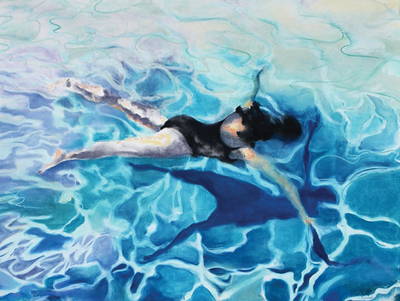GRACE & GRAVITY: DEBORAH BARONAS

Deborah Baronas, Heaven, 2016, pastel on paper, 36 x 42″.
Photo: Greg Spiess.
Deborah Baronas’ Grace & Gravity—an exhibit of mixed media figurations starring dancers, athletes and swimmers—combines two activities that have shaped her life: work and play. As a child she not only danced but helped harvest tobacco on her grandfather’s farm. Her previous oeuvre investigated similar motifs as
it exposed and celebrated the scant recreation allowed factory workers.
No knowledge of this (admittedly captivating) thematic continuity is needed to enjoy Grace & Gravity. Baronas’ superb draftsmanship is readily observed, with a looseness and spontaneity that tempers her thorough attitude toward process, which employs a variety of material interventions. Fabrics or etched glass, both with digitally-printed imagery, are laid atop her drawings and paintings. Baronas excels at depicting motion and might not need these accoutrements, though she finds they show “the transformation of a form.”
Baronas’ meticulous methodology mirrors the blue collar ethic she seeks to honor, and here she reiterates a crucial chapter in the saga of work: leisure. But even with her sights on play, Baronas never forgets the source from which it is squeezed: alienated labor, taxed from the proletariat by an oppressive (though historically specific) necessity.
Even at rest, the specter of work hovers above the heads of Baronas’ figures. The stimulating vibrancy of Flying, based on a family vacation photo, is paired with an overlay that recalls Baronas’ job-related anxieties at the time. She notes that even the athletes she draws—lithe bodies, nimble movements—obtain their poise only through excruciating and corporeal toil. The show’s title is then a shrewd observation. Gravity provides the harshest comedowns from bodily heights.
One of Baronas’ earliest paintings is of herself sitting at the pool her father built. She believes this pool summarizes an unspoken antibiosis: enjoyment is procured only by drudgery (usually someone else’s). Baronas returns to these memories of the pool’s otherworldly blue in the pastels Heaven and Floating, presented without embellishment. Suspended in aqua, a girl is cocooned in a tensionless and buoyant pleasure. In the bath of reverie, chlorine-kissed skin is temporarily free from the demands of industry and labor.
